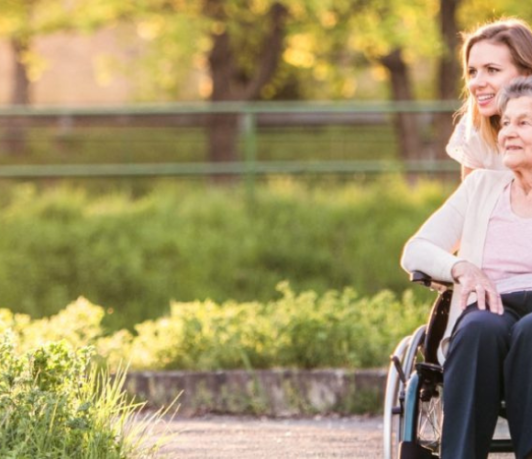How to Stay Socially Connected When Living with a Disability
Health & Wellness |

Living with a disability brings unique challenges, but maintaining an active social life is not beyond reach and should be encouraged. In this blog, we’ll delve into practical tips on how you can stay socially active while living with a disability, including discussing the integral role that home care services can play to support these connections.
The health impacts of staying socially active
Cultivating social connections isn’t just about enjoying companionship, it significantly impacts overall health and wellbeing, particularly as you get older. Numerous studies have highlighted the benefits of staying socially active, pointing to a direct correlation between robust social connections and improved physical and mental health.
Physically, regular social engagement has been linked to a strengthened immune system. Interacting with others stimulates the production of immune-boosting hormones, contributing to a more resilient defence against illnesses. Moreover, engaging in social activities often involves physical movement – whether it’s a stroll in the park, a dance class, or a shared hobby – promoting mobility and overall physical fitness.
Beyond the physical side, social connections play a pivotal role in maintaining cognitive function. For older Australians, participating in stimulating conversations, engaging in activities that require mental effort, and sharing experiences with others contribute to cognitive vitality. Social interactions act as a mental workout, potentially lowering the risk of cognitive decline and neurodegenerative conditions.
Mentally and emotionally, social connections can also serve as a buffer against feelings of loneliness and depression, which common challenges faced by older individuals. Regular social interactions provide a support system, fostering a sense of belonging and purpose. This emotional support is particularly crucial during significant life transitions, such as retirement or the loss of a loved one.
The emotional benefits extend to stress reduction. Meaningful social connections create a positive environment where individuals can share their concerns, seek advice, and find solace. This emotional support contributes to lower stress levels and can even positively impact blood pressure and heart health.
10 tips to stay socially active
Especially considering the care services and opportunities available through home care services, let’s discuss some tips that you can employ to keep up your social activity, despite living with a disability.
Interested in reading more about home care? We’ve developed a suite of blogs to help you learn more about home care and the types of service and support it offers. To begin, read our comprehensive guide.
1. Embrace the digital realm for social interaction
The digital era offers unprecedented opportunities for connectivity. Utilise video calls, social media platforms, and online communities to stay connected with friends, family, and like-minded individuals. This becomes especially valuable when mobility is a concern.
2. Participate in local community groups
Beyond basic assistance, home care services often extend support into community involvement. Providers can facilitate connections with local groups and events tailored to individual interests. From book clubs to fitness classes, engaging in these activities not only fosters social connections but also nurtures a sense of community.
3. Explore home care services designed for social wellbeing
Look for home care services explicitly addressing social engagement. Some providers offer companionship services, where caregivers spend time engaging in conversations, playing games, or accompanying individuals to social outings. This personalised approach ensures that social needs are met alongside essential care requirements.
4. Plan and organise regular outings
Stepping out of one’s comfort zone is often the key to maintaining an active social life. Home care providers can assist in planning and organising regular outings, whether it’s a visit to the local park, a coffee catch-up, or attending community events. These outings contribute to a fulfilling social calendar and provide opportunities for new experiences.
5. Connect with supportive communities
Living with a disability can be isolating but connecting with others who share similar experiences can be empowering. Home care services may provide information on local support groups or facilitate virtual meet-ups. Sharing stories, advice, and camaraderie can help combat feelings of loneliness.
6. Attend inclusive events
Look for events and activities designed to be inclusive for people with disabilities. Home care providers often have access to information about such events in your area. Whether it’s accessible art exhibitions, adaptive sports events, or disability-friendly social gatherings, these activities offer enjoyable and accessible social opportunities.
7. Optimise your home for social interaction
Creating a welcoming and accessible home environment is crucial for facilitating social interactions. Home care services can assist in making modifications to your living space, ensuring it’s conducive to socialisng. This could involve installing ramps, adjusting furniture layouts, or incorporating assistive devices to enhance accessibility.
8. Engage in virtual classes and workshops
Stay socially active while expanding your skillset by enrolling in virtual classes. Whether it’s an art class, language course, or a cooking workshop, the online world offers numerous opportunities for learning and socialising simultaneously.
9. Pursue hobbies with caregiver support
Home care providers can tailor their services to support your hobbies and interests. Whether you enjoy gardening, painting, or crafting, having a caregiver assist you in pursuing these activities enhances your wellbeing and provides a natural avenue for social interaction.
10. Foster open communication with caregivers
Effective communication is vital, including with your caregiver. Clearly express your social preferences and expectations, ensuring that your caregiver understands the importance of social engagement in your daily life. This open dialogue fosters a supportive environment for maintaining social connections.
Supporting a loved one: A guide for family and friends
Living with a disability not only impacts the individual but also those close to them. If you have a friend or family member navigating life with a disability, your support can play a crucial role in helping them stay socially active. Here are practical ways you can contribute to enhancing their social engagement:
1. Encourage and facilitate digital connections
Help your loved one embrace technology for social interaction. Assist in setting up video calls, guide them through social media platforms, or explore online communities together. Your encouragement can alleviate any hesitations they may have about using digital tools to stay connected.
2. Explore shared interests and activities
Identify and engage in activities that align with your loved one’s interests. Whether it’s attending community events, joining local groups, or simply spending quality time together, your participation can make these experiences more enjoyable and provide crucial social support.
3. Be proactive in planning outings
Take the initiative in planning and organising outings. Research accessible venues and events, ensuring that your loved one can participate comfortably. By handling logistics and offering your company, you make social activities more accessible and enjoyable.
4. Promote inclusivity at family gatherings
When hosting family gatherings, consider accessibility. Ensure that the venue is wheelchair-friendly (if needed) and activities are inclusive. By actively thinking about your loved one’s needs, you contribute to a more inclusive family environment that fosters social connections.
5. Stay informed about local support groups
Be proactive in researching and staying informed about local support groups. Your knowledge can be invaluable in connecting your loved one with like-minded individuals and supportive communities. Offer to accompany them to group meetings or assist in setting up virtual meet-ups.
6. Provide emotional support
Living with a disability can be emotionally challenging. Be a supportive listener, offering a non-judgmental space for your loved one to express their feelings. Understanding their emotional needs contributes to a strong support system, reinforcing their confidence in social situations.
7. Learn about adaptive technologies and tools
Familiarise yourself with adaptive technologies and tools that can enhance your loved one’s accessibility. This may include knowledge about mobility aids, assistive devices, or apps designed for people with disabilities. Your understanding can contribute to a more seamless and inclusive social experience.
8. Join social activities together
Participate in social activities alongside your loved one. Whether it’s a fitness class, hobby group, or volunteering opportunity, your presence not only provides companionship but also helps create a more inclusive environment for them.
9. Offer assistance in home modifications
If your loved one requires modifications to their home for improved accessibility, offer your assistance. Whether it’s helping with research, organising contractors, or providing emotional support during the process, your involvement can contribute to creating a more socially inviting living space.
10. Communicate openly and respect their preferences
Maintain open communication with your loved one about their social preferences. Understand their comfort levels and respect their choices. By fostering open dialogue, you create a supportive environment where they feel understood and empowered in their social interactions.
In summary
Living with a disability does not preclude a rich and fulfilling social life, and home care services can play a key role in enhancing social wellbeing. By incorporating the above practical tips and leveraging the support of home care providers, older Australians can continue to lead socially active and meaningful lives.
Interested to learn more about our services?
Simply fill in the below form and one of our friendly team will give you a call within 48 hours.




